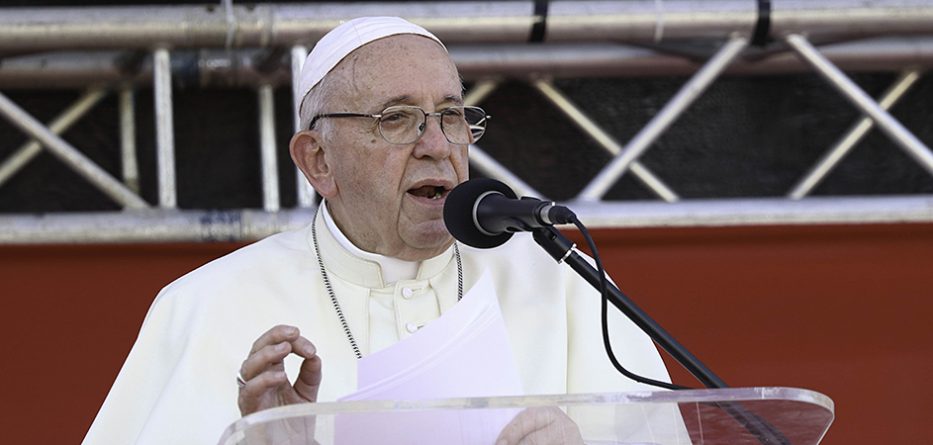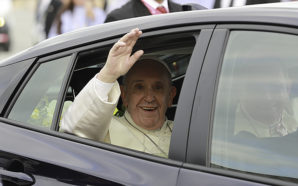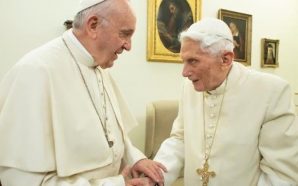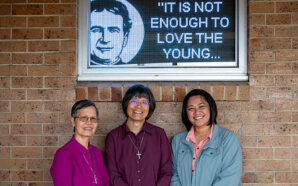MESSAGE OF HIS HOLINESS FRANCIS
OPENING OF THE WORKS OF THE SPECIAL ASSEMBLY OF THE
SYNOD OF BISHOPS FOR THE PANAMAZZONICA REGION ON THE THEME
“NEW PATHS FOR THE CHURCH AND FOR AN INTEGRAL ECOLOGY”
7 OCTOBER 2019
Sisters and Brothers, good morning!
Welcome to all and thank you for your preparatory work: all have worked so much, from that moment at Puerto Maldonado until today.
The Synod . . . [I will speak in Spanish, it’s better (translation)]
We can say that the Synod for Amazonia has four dimensions: the pastoral dimension, the cultural dimension, the social dimension and the ecological dimension. The first, the pastoral dimension is the essential one, the one that encompasses everything. We approach with a Christian heart and see the reality of Amazonia with a disciple’s eyes, to understand it and interpret it with a disciple’s eyes, because neutral, aseptic hermeneutics don’t exist; they are always conditioned by a previous option, our previous option is that of the disciples. And I also know that of the missionaries, because the love that the Holy Spirit puts in us drives us to the proclamation of Jesus Christ; a proclamation — we all know it — which must not be confused with proselytism, but we approach to consider the Amazonian reality, with this pastoral heart, with the eyes of disciples and missionaries because the proclamation of the Lord urges us. And we also approach the Amazonian people on tiptoes, respecting their history, their cultures, their style of good living, in the etymological sense of the word, not in the social sense that we give it so often, because the people have their own identity, all the people; they have their own wisdom, awareness of themselves, the people have a feeling, a way of seeing the reality, a history, a hermeneutic and they tend to be protagonists of their own history with these things, with these qualities. And we approach foreign to ideological colonizations, which destroy or reduce the idiosyncrasy of the people. Today this <matter> of ideological colonizations is so common. And we approach without the business zeal to make pre-made programs for them to “discipline” the Amazonian people, to discipline their history, their culture; not that, not that zeal to domesticate the native people. When the Church forgot this, the way she should approach a people, she was not inculturated; she even reached a point of disparaging certain people and how many failures <there were>, which we lament today. We think of De Nobile in India, Ricci in China and so many others. “Homogenizing” and “homogenizer” centralism did not let the authenticity of the people’ culture emerge.
Ideologies are a dangerous weapon; we always tend to grab an ideology to interpret a people. Ideologies are reductive, and they lead us to exaggeration in our pretension to understand intellectually, but without accepting, understanding without admiring, understanding without assuming and then the reality is received in categories, the most common are the categories of “isms.” Then when we have to approach the reality of a native people we speak of Indianisms, and when we want to give them a way out to their living better, we don’t ask them, we speak of developmentalism. These “isms” re-formulate life from the illustrated and enlightened laboratory. They are mottos that take root and program the approach to native people. In our country, a motto: “civilization and barbarism” served to divide, to annihilate and reached its culmination toward the end of the 80s, [in the 19th century] annihilating the majority of the native people, because they were “savage” and “civilization” came from another side. It’s contempt for the people and — I refer to the experience of my land — to that, “civilization and barbarism,” which served to annihilate people, still continues in my homeland, with offensive words, and then there is talk of a second degree civilization, those that come from barbarism, and today they are the “marbles, the Paraguayans, the <toadstools> , the little black heads,” always removing ourselves from the reality of a people, qualifying it and putting distances. That’s the experience in my country — and then, contempt. Yesterday I was very sad to hear, here, in a mocking comment, on that pious man who brought the offerings with feathers on his head, tell me: What difference is there between wearing feathers on the head and the “three-cornered hat” that some officials of our Dicasteries wear? Then we run the risk of proposing simply pragmatic measures, when, on the contrary, we are asked to contemplate the people, <to have> a capacity of admiration, which makes one have a paradigmatic thought. If someone comes with pragmatic intentions, let him pray the “I, sinner,” let him convert and open his heart to a paradigmatic perspective that is born of the reality of the people.
We haven’t come here to invent programs of social development or the custody of culture, of a museum type, or pastoral actions with the same non-contemplative style with which they are taking forward actions of an opposite sign: deforestation, uniformity, exploitation. They also make programs that don’t respect poetry — I permit myself the word –, the reality of the people, which is sovereign. We also must take care of our worldliness in the way of exacting points of view, changes in the organization. Worldliness always infiltrates itself and it removes us from the poetry of the people. We come to contemplate, to understand, to serve the people, and we do so by following a Synodal path, we do it in a Synod, not in round tables, not in conferences or ulterior discussions; we do it in a Synod, because a Synod isn’t a Parliament, it isn’t a parlour, it’s not demonstrating who has more power over the media and who has more power among the networks to impose any idea or any plan. This configures a congregational church, if we pretend to seek through surveys who has a majority. Or a very distant sensational church, so distant from “our Holy Mother Catholic Church, or as Saint Ignatius liked to say: “our Holy Mother hierarchical Church.” A Synod is to walk together under the inspiration and guidance of the Holy Spirit. The Holy Spirit is the Synod’s principal actor. Please, let us not chase Him out of the Hall. Consultations were held, they were discussed in the Episcopal Conferences, in the Pre-Synodal Council; an Instrumentum Laboris was elaborated that, as you know, is a martyr text, destined to be destroyed, because it is the starting point for what the Spirit is going to do in us and, now, we walk under the guidance of the Holy Spirit. Now we have to let the Holy Spirit express Himself in this Assembly, to express Himself among us, to express Himself with us, through us, and to express Himself “despite” us, despite our resistances, that it’s normal for them to exist, because the life of a Christian is like this.
And then, what will be our work here to ensure that this presence of the Holy Spirit is fecund? First of all, <we must> pray. Brothers and sisters, I ask you to pray a lot. To reflect, dialogue, listen with humility, knowing that I don’t know all. And to speak with courage, with parrhesia, even if I have to be embarrassed, <I must> say what a feel, discern and all this inside, protecting the fraternity that must exist inside here. And to foster this attitude of reflection, prayer, discernment, of listening with humility and of speaking with courage. After four interventions we will have a space of four minutes of silence. Someone said: “It’s dangerous, Father, because they are going to fall asleep.” The experience of the Synod on young people, when we did the same, was rather the contrary; they tended to fall asleep during the interventions, at least <it happened> with some, and they woke up in the silence. Finally, to be in the Synod is to have the courage to enter in a process. It’s not about occupying a place in the Hall. <It’s about entering in a process. And ecclesial processes have a need. They need to be protected, taken care of, like a baby, accompanied in the beginning. Taken care of with delicacy. They need the warmth of community; they need the warmth of mother Church. This is how an ecclesial process grows. Therefore, the attitude of respect, of taking care of the fraternal atmosphere, the air of intimacy is important. And it’s about not venting everything, as it comes, outside. However, it’s not in respect of those that we must inform of a secret more proper of lodges than of the ecclesial community, but yes of delicacy and of prudence in the communication we will engage in outside. And this necessity to communicate outside to so many people that want to know, to so many of our brothers, journalists, who have the vocation to serve so that one knows, and to help this, foreseen are the press services, the briefings, etc.
However, a process such as that of a Synod can be ruined somewhat if, when I go out of the Hall, I say what I think, I give my opinion, and then that characteristic happens that happened in some Synods: of the inside Synod and the outside Synod. The inside Synod, which follows a path of Mother Church, of care for the processes, and the outside Synod, which, because of information given lightly, given with imprudence, moves ex officio reporters to make mistakes. Thank you for what you are doing, thank you for praying for one another, and courage. And, please, let’s not lose our sense of humour.
From the Vatican, 7 October 2019, Memorial of Our Lady of the Rosary
FRANCIS
With thanks to the Vatican and Zenit.
The Special Assembly of the Synod of Bishops for the Pan-Amazon Region will be held in the Vatican from 6 to 27 October. For more information, click here.








